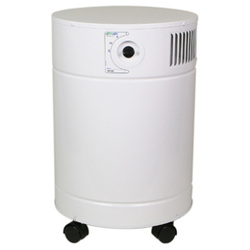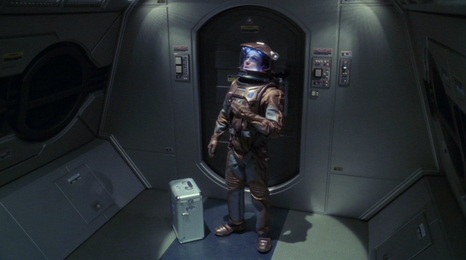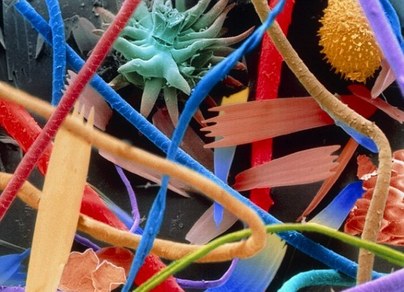Water Filtration
The water we drink, cook and bathe with is highly contaminated with everything from industrial waste and pesticides to prescription medications. I will also be traveling in some very dirty places, as I visit and write about front line communities being impacted by environmental toxicity. I've spent a lot of time researching water filtration systems for my tiny home, taking into account my need for extremely well filtered water, and the small amount of space I have available. I've decided to go with PureEffect, using a whole house filter for all water that enters the house, and then a second filter to further decontaminate my drinking and cooking water, including filters for microorganisms. I've also been using Binchotan charcoal from Japan to purify and remineralize the crock of drinking water I keep in my bedroom.
Air Filtration

This is often the first line of defense for people with EI/MCS. A good air filter can literally create breathing space from the constant impact of chemical exposure. I have two in my large bedroom. This keeps the air in my personal space at a better level of purity than the rest of my father's house. When outdoor pollutant levels are high, I turn both machines on high, to filter out wood smoke, barbecue lighter fluid, etc. For the Vehicle, I'll have a much smaller space to clean, but I also need the filters to either be built into the structure rather than taking up floor space, or else have multiple uses. Whole house filters are built in, but rely on forced air heating systems, so they won't work for me. I chose a filter rated for a much bigger space than my 204 square feet, so it can do an excellent job at a lower setting. The best filters have a CADR (clean air delivery rate) of over 350. Most are in the 200-300 range. Mine is an IQ Air Health Pro.
People and Their Products
 Airlock room.
Airlock room.
Human behavior is the most challenging aspect of EI survival for many of us. On the biggest scale we're talking about the pursuit of profit through reckless industrial development that endangers our health and our planet. Many of us became ill as a result of an overwhelming exposure, or a long slow one. My tipping points include pesticide exposure as an infant and toddler, and moving into a new home full of VOC emitting paint, carpet and furnishings while my immune system function was lowered by pregnancy.
On the smaller scale, I struggle a lot with people's misinformation, disbelief and sometimes outright hostility.
Most people I meet 1) don't believe something that doesn't affect them could really make me sick, and assume I am acting out in some way, demanding special treatment in order to get attention, 2) sort of believe me, but have a hard time remembering or committing to the necessary changes because they feel uncomfortable, so they keep cheerfully showing up with fragrance on, and are surprised every time when I tell them I can't be near them, 3) are willing to change but make assumptions about what will affect me instead of asking what would be most helpful, so they will proudly announce that having washed their clothes in a new unscented detergent, all is now well. But removing laundry product smell from fabric requires multiple washes in baking soda, and a cleaning of the washer and dryer.
Part of keeping my home safe for me is making sure people who visit me are aware of MY needs around chemical exposure, and how best to meet them. My attendants and our house cleaner all shower when they arrive, bag up their street clothes, and wear clothing I provide, that is only washed here. Sometimes they have to scrub with baking soda and other cleansers, to remove fragrance from their hair and skin. In the long run, anyone who wants to get near me will have to stop using fragrance, including all personal, laundry and household products with scent: detergent, fabric softener, dryer sheets, shampoo, lotion, conditioner, gel, deodorant.
In the Vehicle, my space will be divided into two sections, a "dry" space for sleep and work, and another for "wet" activities like cooking and bathing, with an airtight door between the two. My main entrance will be through the "wet" room, so people can shower and change before coming into my private space. I'll have a fold-down outdoor social space for times when the outdoor air is clean and warm and the breeze becomes my friend. There will also be external storage spaces for items that need to out-gas for a while--or visitor clothing, once they've changed. Mechanical meets social.
On the smaller scale, I struggle a lot with people's misinformation, disbelief and sometimes outright hostility.
Most people I meet 1) don't believe something that doesn't affect them could really make me sick, and assume I am acting out in some way, demanding special treatment in order to get attention, 2) sort of believe me, but have a hard time remembering or committing to the necessary changes because they feel uncomfortable, so they keep cheerfully showing up with fragrance on, and are surprised every time when I tell them I can't be near them, 3) are willing to change but make assumptions about what will affect me instead of asking what would be most helpful, so they will proudly announce that having washed their clothes in a new unscented detergent, all is now well. But removing laundry product smell from fabric requires multiple washes in baking soda, and a cleaning of the washer and dryer.
Part of keeping my home safe for me is making sure people who visit me are aware of MY needs around chemical exposure, and how best to meet them. My attendants and our house cleaner all shower when they arrive, bag up their street clothes, and wear clothing I provide, that is only washed here. Sometimes they have to scrub with baking soda and other cleansers, to remove fragrance from their hair and skin. In the long run, anyone who wants to get near me will have to stop using fragrance, including all personal, laundry and household products with scent: detergent, fabric softener, dryer sheets, shampoo, lotion, conditioner, gel, deodorant.
In the Vehicle, my space will be divided into two sections, a "dry" space for sleep and work, and another for "wet" activities like cooking and bathing, with an airtight door between the two. My main entrance will be through the "wet" room, so people can shower and change before coming into my private space. I'll have a fold-down outdoor social space for times when the outdoor air is clean and warm and the breeze becomes my friend. There will also be external storage spaces for items that need to out-gas for a while--or visitor clothing, once they've changed. Mechanical meets social.
Dynamic Cleanness
 Household dust--hair, insect bits, skin cells, pollen, fibers.
Household dust--hair, insect bits, skin cells, pollen, fibers.
Part of keeping my indoor space free of toxins has to do with controlling what's produced just by living. There are the obvious kinds of waste disposal--taking out garbage, recycling and compost, washing dishes and clothing, the composting toilet and grey water system. But my body also sheds bits of skin and hair that become dust, and I breathe out moisture that needs to be vented. Some of this will be dealt with by the air filter, and I also have a HEPA vacuum cleaner. But the biggest challenge to cleanliness is clutter. It's very hard to dust surfaces that have dozens of objects on them. So part of my purification plan is about making it easier to remove dust, which in turn feeds mold and mites.
I collect lots of small images-- cards, fliers, bits of art people send me. I stick them on my walls and then take them down and stick up others, and the extras get piled up. I've started a binder to keep the best of them in plastic sleeves. I also tend to pile up clothing. Like most people, I wear 20% of what's in my closet 80% of the time. So I'm going to move toward a small collection of well made garments that I love, and wear them all the time. I plan on having four plates, four bowls and four mugs.
My biggest clutter challenge is paper. I have eight file drawers and probably ten boxes, plus several tall piles. I'm scanning what's most important and letting go of the rest. I've been thinking lately about the hoarding of information, and how we're constantly urged to know everything. I grew up on a remote tropical farm, with no phone, no TV, and of course no cell phone or internet, and lots of slow books and slower trees. I love the internet. I use it constantly. But it's jammed full of way too many tidbits of distraction. So another part of my preparation for small house living is to slow the flow of information and be way more selective about what I try to hold on to.
I collect lots of small images-- cards, fliers, bits of art people send me. I stick them on my walls and then take them down and stick up others, and the extras get piled up. I've started a binder to keep the best of them in plastic sleeves. I also tend to pile up clothing. Like most people, I wear 20% of what's in my closet 80% of the time. So I'm going to move toward a small collection of well made garments that I love, and wear them all the time. I plan on having four plates, four bowls and four mugs.
My biggest clutter challenge is paper. I have eight file drawers and probably ten boxes, plus several tall piles. I'm scanning what's most important and letting go of the rest. I've been thinking lately about the hoarding of information, and how we're constantly urged to know everything. I grew up on a remote tropical farm, with no phone, no TV, and of course no cell phone or internet, and lots of slow books and slower trees. I love the internet. I use it constantly. But it's jammed full of way too many tidbits of distraction. So another part of my preparation for small house living is to slow the flow of information and be way more selective about what I try to hold on to.